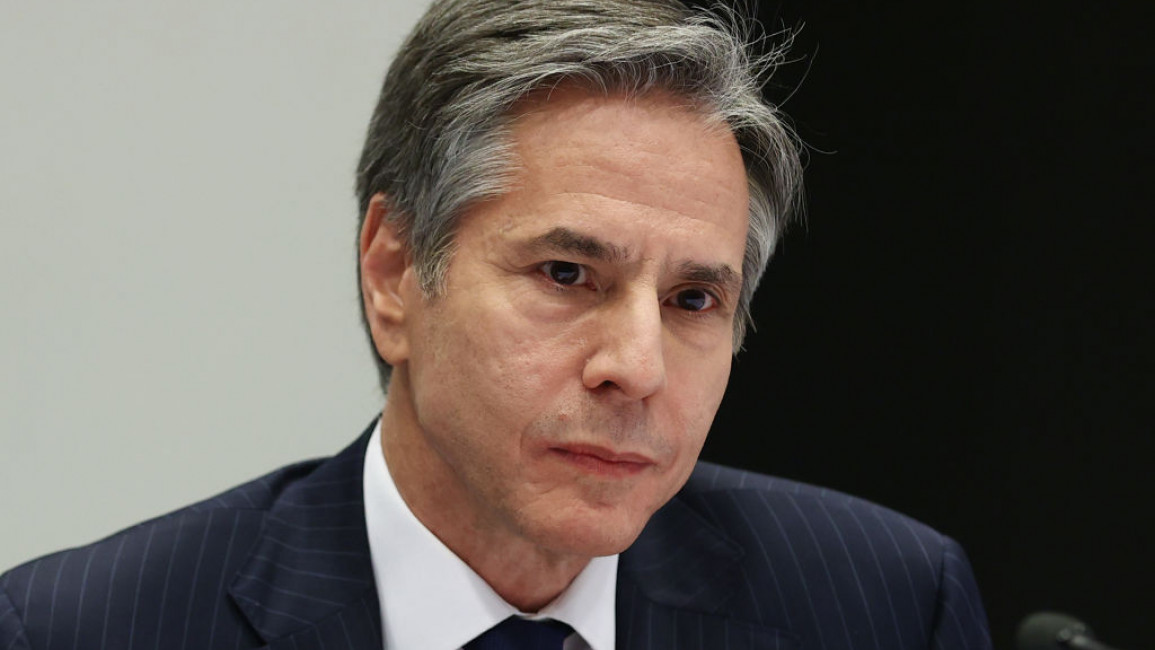US to proceed on Palestine consulate in Jerusalem despite Israeli opposition: Blinken
US Secretary of State Antony Blinken said on Wednesday the Biden administration intends to press ahead with its plan to reopen the Jerusalem consulate that traditionally engaged with Palestine and Palestinians, despite Israeli opposition to such a move.
Blinken reiterated a pledge he originally made months ago on re-establishing the consulate, which had long been a base for diplomatic outreach to Palestine before it was closed by President Joe Biden’s predecessor, Donald Trump, in 2018.
But Blinken, speaking at a Washington news conference with visiting Israeli Foreign Minister Yair Lapid and United Arab Emirates FM Sheikh Abdullah bin Zayed Al Nahyan, stopped short of setting a date for reopening the consulate, which would strain relations with Israel’s new government, whose members range from far right to Palestinian Islamist.
“We'll be moving forward with the process of opening a consulate as part of deepening of those ties with the Palestinians," Blinken said at the State Department.
The Biden administration has sought to repair Palestinian relations that were badly damaged under Trump.
The consulate was subsumed into the US Embassy that was moved to occupied Jerusalem from Tel Aviv in 2018 by Trump - a reversal of long-time US policy hailed by Israel and condemned by Palestine.
The Biden administration says it will reopen the consulate while leaving the embassy in place.
Israel illegally annexed East Jerusalem in 1980 in a move widely rejected by the international community, and claims the entire city to be its capital. The United Nations recognises East Jerusalem as occupied Palestinian land, and Palestinians understand this area as being the future capital of their independent state.
Blinken spoke in response to a reporter's question after a trilateral meeting that marked the latest sign of the Biden administration’s embrace of the so-called Abraham Accord normalisation agreements, which were seen as a diplomatic boost for Trump.
The UAE was the first of four Arab states that moved late last year to normalise relations with Israel, in the first such move for decades. Bahrain, Sudan and Morocco soon followed suit.
Palestinian officials said they felt betrayed by fellow Arab nations for reaching deals with Israel without first demanding progress toward the creation of an autonomous Palestinian state.
Many critics said Trump had promoted Arab rapprochement with Israel while ignoring Palestine and its aspirations for independent statehood.
Abraham Accords
Biden administration officials have said the Abraham Accords are no substitute for a two-state solution between Israel and Palestine, a principle of US policy that the Democratic president has returned to after Trump moved away from it.
But US officials have said the conditions are not right to press for a resumption of Israeli-Palestinian talks, which collapsed in 2014. Washington has been reluctant to take any action that could weaken an Israeli government it considers more cooperative than the one led by Likud party leader Benjamin Netanyahu, which was unseated in June.
Reopening the consulate, however, would ignite tensions between Washington and its close Middle East ally.
Israel has said it would oppose the move, continuing to assert its internationally rejected claims of sovereignty over the whole of Jerusalem and alleging far-right Prime Minister Naftali Bennett’s government would be destabilised by the reintroduction of a diplomatic foothold for Palestine in the occupied city.
Blinken expressed hope that normalisation between Israel and Arab states would be a "force for progress" between Israelis and Palestinians, reaffirmed support for a two-state solution and said both sides "equally deserve to live safely and securely."
The foreign minister of the United Arab Emirates has said that he would visit Israel soon, but that there could be no talk of peace in the Middle East if Israel and Palestine do not communicate...https://t.co/EJ0efL802F
— The New Arab (@The_NewArab) October 14, 2021
Bin Zayed echoed Lapid in praising the widely criticised ties their countries have forged and said he would visit Israel soon. But he also insisted that there could only be peace in the region if the Israelis and Palestinians are on "talking terms."
Lapid said the Palestinians, like all people, were "entitled to a decent way of life" and claimed Israel's goal was to work with the Palestinian Authority on that issue, though offered no specifics.
Lapid, of the centrist Yesh Atid, reached a power-sharing deal with Bennett that ended Netanyahu's 12-year run as prime minister. Under the coalition deal, Lapid will replace Bennett as prime minister in 2023.
(Reuters)



